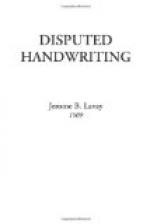The writing of England is either angular (for rapid business style), or the civil-service round-hand—too slow for the every-day rush of business. England’s colonies, influenced by her copy-books and teachers, write about as England does. Canada is an exception, as her proximity to the United States causes her to mix the English and American styles, with the American gaining ground.
The German and French write two radically different styles. Hence the identity of the nation producing the writer as well as the identity of the writer himself usually can be established. Before the writer is known this frequently is of great benefit to the cause of justice as it narrows down the search.
A case such as the Dreyfus affair has a tendency to confuse the public mind and leads to wrong conclusions. In initiating the prosecution of Dreyfus the French government submitted the documents to expert Gobert, of the Bank of France, who is considered the leader in this line in France. Gobert reported that Dreyfus did not write the incriminating documents. The prosecutors then placed the papers in the hands of Bertillon, the inventor of the anthropometric system of measurements (used principally on criminals) which bears his name. It mattered not that Bertillon had never appeared in a handwriting case before, or that his skill in this line was unknown. He was a man of science, of great renown in other lines, and the government relied on these facts to bolster up its claim that Dreyfus wrote the incriminating papers Bertillon reported in favor of the government’s contention, and it was an easy matter to get some alleged experts—weak as to will and ability—and one or two honest but misguided men to agree with him. Some of these afterward changed their opinions when better standards of writing were given to them.
Dreyfus’ friends sent engraved reproductions of standards and disputed documents to the best-known experts all over the world, and without exception these reported that Dreyfus was not the writer of the disputed papers. On the side of the French government were a few so-called “experts,” headed and dominated by a man with no experience whatever. The experts of skill and experience in France and the world over were practically unanimous in favor of Dreyfus. A critical examination of the documents in question produced an absolute conviction that they could not possibly have been written by Dreyfus.
Unless the individual is fitted by nature and inborn liking for investigations of this character, no amount of education and experience will fit him. But, given natural equipment and inclination, it is necessary first of all that the expert have a good general education. He should have a sufficient command of language to make others see what he sees. He should have a good eye for form and color, and a well-trained hand to enable him to describe graphically as well as orally what his trained eye has detected. A few strokes on a blackboard or large sheet of paper will often make a clouded point appear much plainer to court, jury and lawyers than hours of oral description. The ability to handle the crayon and to simulate well the writings under discussion is a great aid.




